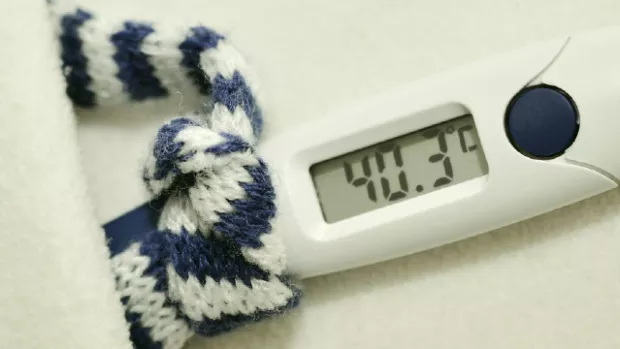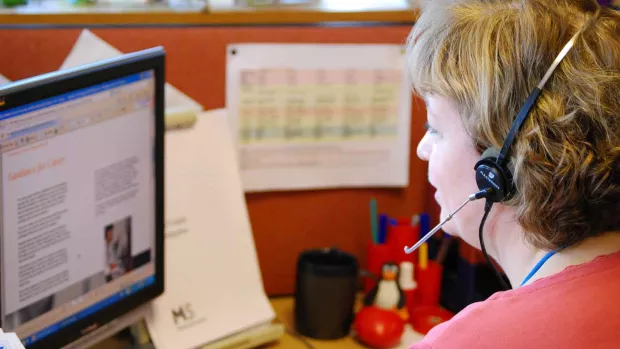
Monkeypox (mpox) and MS
An outbreak of monkeypox (or 'mpox') has hit the headlines in recent months. We look at what it means for people with multiple sclerosis and answer some of the questions you might have.
- Is mpox the same as monkeypox?
- How many people have monkeypox (mpox) in the UK?
- Is monkeypox (mpox) dangerous if I have MS?
- What are the symptoms of monkeypox?
- How do you catch monkeypox?
- Can I have a monkeypox (mpox) vaccine if I’ve got MS?
- What do I do if I think I have monkeypox?
- Am I immunosuppressed?
Is mpox the same as monkeypox?
Mpox is the new name for monkeypox. It's the same disease, but the World Health Organisation (WHO) started using the name mpox in November 2022. You might come across both names for the same disease: mpox or monkeypox.
How many people have monkeypox (mpox) in the UK?
Between May and September 2022, around 3,400 cases of monkeypox (mpox) had been detected in the UK. Almost all were in England, most in London. So far, the vast majority of those cases are in men who have sex with men.
But anyone could get monkeypox. So it’s important to know about the symptoms and what to do if you think you might have it. Monkeypox isn’t a sexually transmitted disease, but it’s spread through close contact.
There are likely to be more people with the infection who’ve not been identified. But, even so, this is a very small number. Over 67 million people live in the UK.
In May 2023, the World Health Organisation (WHO) declared the monkeypox (mpox) global public health emergency over. They warned that the virus is still around and further outbreaks could continue, but the highest level of alert is over.
It’s unlikely this outbreak will quickly become a big problem in the UK. Monkeypox doesn’t spread as easily as COVID-19. And these kinds of ‘poxviruses’ don’t change (or ‘mutate’) so quickly either.
But to control the outbreak, the UK Government is urging people to:
- keep an eye out for monkeypox symptoms
- self-isolate if you’ve been diagnosed with monkeypox or you’re showing symptoms
If you live with someone who has monkeypox, you don’t need to isolate unless you get symptoms.
Read the UK Government advice on isolating if you or someone you live with has monkeypox
Read the latest UK Government data on monkeypox (mpox) cases
Is monkeypox (mpox) dangerous if I have MS?
Monkeypox (mpox) is usually mild and most people get better in a few weeks without treatment. There’s no reason to think this would be different for most people with MS.
But monkeypox can be more severe:
- for children
- if you’re pregnant
- if you’re immunosuppressed
Do people die from monkeypox?
There are two types of monkeypox. The west African type in this outbreak is usually the milder of the two. In recent outbreaks in west Africa, between 3 and 6 people die out of every hundred people who catch it. In this outbreak no one has died of monkeypox in the UK.
What are the symptoms of monkeypox?
The first symptoms of monkeypox include:
- a high temperature
- a headache
- muscle aches
- backache
- swollen glands
- shivering
- exhaustion
Between 1 and 5 days after the first symptoms, a rash like chickenpox usually appears. Often it starts on the face, the spreads to other parts.
These symptoms usually clear up after 2 to 4 weeks.
How do you catch monkeypox?
You can catch monkeypox from:
- touching clothing, bedding or towels used by someone with the monkeypox rash
- touching the skin blisters or scabs
- the coughs or sneezes of someone with the rash
So far in the UK people have mainly caught the infection from being in close contact with people at a handful of large festivals or venues, often elsewhere in Europe.
The NHS says you're extremely unlikely to have monkeypox if:
- you haven’t recently been to west or central Africa
- you haven’t been in close contact with someone who has monkeypox (such as touching their skin or sharing bedding)
How can I reduce the risk from monkeypox?
To reduce the risk of getting monkeypox, the NHS recommends:
- regularly washing hands with soap and water or an alcohol-based hand sanitiser
- avoiding close contact with anyone you know who has symptoms
Read the UK Government advice about reducing the risk of catching monkeypox
If you’re a gay or bisexual man
So far gay and bisexual men are the most affected by this outbreak. So the UK Government has specific monkeypox advice for these groups and for other men who have sex with men. It includes checking for symptoms and having the vaccine if you’re offered it. It also says if you think you might have the virus you should avoid having sex or going to events where you might pass the virus on.
Read the latest UK Government monkeypox updatesRead the UK Government advice about the vaccine for monkeypox
If you work in health or social care
If you work in health or social care, your employer should take precautions to help avoid the spread of monkeypox. This might include the use of PPE (Personal Protective Equipment) and the opportunity for some workers to be vaccinated. If you’re immunosuppressed, you might want to talk to your employer about avoiding the high risk settings, like working directly with people who’ve got monkeypox.
Read the UK Government advice about the vaccine for monkeypox
Can I have a monkeypox (mpox) vaccine if I’ve got MS?
There isn’t a monkeypox (mpox) vaccine but people can have the smallpox vaccine instead. It offers a good level of protection, stopping people getting monkeypox in up to 85% of cases. In other words, it stops 17 out of every 20 infections.
Most people with MS can take this vaccine.
But at the moment the government isn’t asking everyone to get vaccinated against monkeypox.
You might be offered the vaccine by the NHS if:
- you’ve been in close contact with someone who has monkeypox
- you have certain jobs in health or social care
- you're a man who has sex with other men
Can I take the vaccine if I’m immunosuppressed?
If you’re immunosuppressed and you’re offered the smallpox vaccine, you should discuss it with a neurologist. It’s a ‘live vaccine’, so there might be a greater risk from the vaccine than for people who aren’t immunosuppressed.
Having MS doesn’t mean you are immunosuppressed. But some disease modifying therapies (DMTs) could mean you’re immunosuppressed.
The UK Government says that even people who’re severely immunosuppressed can use the vaccine. But because of the possible greater risk they say a specialist should give advice. A neurologist can help explain the benefits and risks.
What do I do if I think I have monkeypox?
If you develop monkeypox symptoms, you should contact NHS 111 or call a sexual health clinic immediately. If you’re immunosuppressed, let your MS team know too. If you’re pregnant, let your maternity team know.
Stay at home and avoid close contact with other people until you've been told what to do.
Am I immunosuppressed?
MS itself doesn’t make you immunosuppressed. But some DMTs can affect how well your immune system works, especially in the first few months after having the treatment. If you’re immunosuppressed like this, it can make you more likely to get some types of infections, or get a more severe form of them.
The drugs listed below might make you more likely to get a more severe case of monkeypox. If your treatment involves one of them, you should avoid contact with people diagnosed with monkeypox (or suspected of having it). If you think you’ve been in contact with monkeypox, contact a doctor as soon as you can.
- alemtuzumab (Lemtrada)
- cladribine (Mavenclad)
- fingolimod (Gilenya)
- ocrelizumab (Ocrevus)
- ofatumumab (Kesimpta)
- ozanimod (Zeposia)
- ponesimod (Ponvory)
- siponimod (Mayzent)
- HSCT
The chances of catching monkeypox in the UK are extremely low. But you might want to be especially careful with hand hygiene, and avoid contact with people who you know have been exposed to monkeypox.
Last full review: | Next review:
We also update when we know about important changes.




